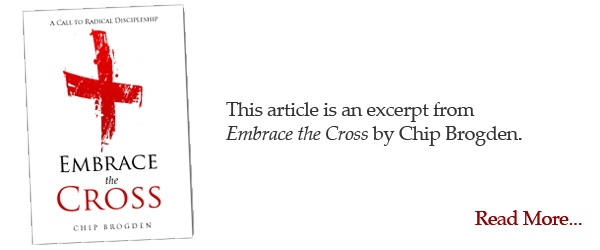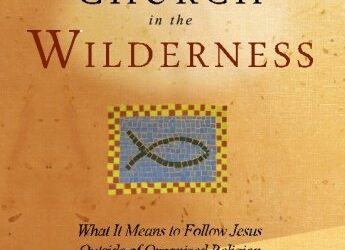and followeth after Me, is not worthy of Me
(Matthew 10:38).”
It is not merely a question of are we following Christ. The crux of the matter is, have we taken up the Cross? There is an order to this call to become disciples of Jesus Christ: first, we must take up our Cross; only then may we follow after Him. It is not, “first follow Me, and later take your Cross.” The Cross is step one. Our taking up the Cross is basic to our following Christ, not something we are called to do after many years. The so-called “deeper Christian life” is but the normal Christian life. Anything less is abnormal. There is no greater depth to the Christian life but what God expects of all of us from the beginning. If we are getting any “deeper” it is only because we have hitherto been shallow. We must take our Cross and follow Jesus.
If I am to take up the Cross it not only signifies my willingness to die, but my actual death. The cross is not theoretical, but very real. Being willing to die is good, but actually dying and then living again is best. To take up the Cross today is to accept the sentence of death today. It is the beginning of the end of my life. The Cross does not merely weaken me, but kills me. Some believe that all is well because they are willing to die for their faith. This is not good enough for Jesus Christ. Many radical religious activists strap explosive devices to themselves and blow up innocent people and buildings because of their faith. Clearly they are deceived by a false sense of duty – yet they are more dedicated to their religion than their Christian counterparts are to their Lord. Faith is not following Christ and then dying, but dying and then following. Here the demands of Christ far exceed those of other religions. Christ bids us to die, and then follow.
Some will say, “I am willing to die now that I have followed.” The person who knows the Cross says, “I am fit to follow now that I have died.” Why is this important? Because Jesus knows that no human being is qualified to follow Him until they have first died. Jesus knows a man cannot live until he has died and been raised to life again. He therefore bids us to die right away, that He may raise us from the dead by His Indwelling Spirit and place us immediately upon the correct path.
A Common Experience
What is the experience of many Christians? They are taught to come to the Lord just as they are, right away, and allow Him to save them. Then they are instructed to read the Bible, pray, attend church services, pay their tithes, and witness for Christ. Surprisingly, it is most difficult for them to forsake sin. Even after many years of faithful activity not a few of them still struggle with the same besetting sins. Or, if they are able through force of will or peer pressure to lay aside the outward sins, they are seemingly powerless to overcome their own inward condition. Pride, gossip, jealousy, self-righteousness, intolerance – many saints are struggling with these things many years after they first begin to follow the Lord, even if they have forsaken their more “physical” vices. And if we look closely enough we will sometimes find that even these obvious “sins of the flesh” are still present, often against their will and in spite of many attempts to forsake their lusts. Yet they cannot overcome them. In a word, some positive changes notwithstanding, the Christian’s life is frequently one of many ups and downs, a few victories sprinkled in amongst many defeats, a cycle of trying, failing, and trying again, continually striving against sin.
If counseling is sought, the Christian in such a situation is basically told to gird up their loins yet again and redouble their efforts in prayer, Bible study, and church attendance. They are encouraged to confess their sins and keep trying. A new book promises to give them the secret of the Christian life, and they eagerly read the book and put some of it to good use for a time, but this too fails to provide a lasting solution to their chronic condition. Or maybe it is a new teaching tape, or a different church. Perhaps a new emphasis on a particular teaching, be it spiritual warfare, prayer, or worship. If fasting is believed to be the answer, then fast they will, but not with any lasting results. They may even hear the message of self-denial and voice their amen to it. They resolve to die and deny themselves. But the more they try to die the more alive they become.
For many years this was my experience. I first prayed to the Lord at the age of eight, and then sought to live a Christian life out of my own efforts. I remember when I was just a boy of thirteen years old. I determined to go to school and live without sinning that entire day. You would think such a task was comparatively easy for a boy, but I found myself to be sinning almost before school started! My thoughts, my words, my actions, all rose up to condemn me. At the end of the day I could only pray for forgiveness and resolve to do better tomorrow. Yet I again met with failure. Just as I was sure that victory was mine, I would fall – and it was not even 9:00! By lunch I had given up, and by evening I was confessing my sins again and resolving to do better the next day. Through the years I have counseled and prayed with enough Christians to know that my experience is neither unusual nor unique, and is common to saints of all ages and backgrounds.
What is the problem here? It is simply this: we attempt to follow before we have died. It is unfortunate that after many years of service the Lord still has to call us back to the Cross, yet this is precisely where we should have begun. Although we ought to encourage people to come as they are and trust the Lord for salvation, we must also teach them that they must count the cost and take up the Cross: else they are not worthy of Jesus! God cannot fill us until He empties us. The Cross is where we are poured out that He may pour in. Unfortunately, salvation as preached today results not in death, but in “swooning”. There is an ecstatic joy and the “near death experience” of a token surrender, but it is not real death. The convert merely changes his conduct, cries a few tears, yet he still lives. The outward deportment may be different, but he has not died. He commences to follow the Lord and fill his life with spiritual activity, but his many failures and shortcomings prove something is missing in his experience. What is it? He knows the Cross only as something Jesus died on for him. The Cross does not represent his own death, but his Lord’s death. It is seldom presented as anything other than the means of atonement and forgiveness of sins. Few realize it is the means by which we enter, as well as live, the Christian life.
Following Christ Vs. Taking Up the Cross
May God give us spiritual vision to see the multitudes who claim to be following Christ today. If we were to pick one of these followers out of the crowd and ask if they are truly following the Lord, they will probably say yes. If we were to ask how they know they are following Christ, they are likely to point to a time in which they prayed the sinner’s prayer and received Christ. Or they will talk about the church they attend, or their knowledge of spiritual things, or their particular ministry. It is interesting that while most Christians know that they are not saved by works, when pressed they will nevertheless point to their works as proof that they are indeed following the Lord.
Certainly we do not wish to discourage anyone from spiritual duties and activities. Yet we maintain that it is possible to follow Christ and yet not be worthy of Him. I am not too interested in someone’s ability to teach the Scriptures, faithfully attend church services, witness to strangers, build churches or display other external “evidences” of following Christ. Though admirable, I only wish to know, have you taken up the Cross? Have you died? If you will but go to the Cross and die, then there is hope for you. Otherwise you are just another religious person. People will do anything to save themselves from death on a Cross – if necessary, they will even pursue a religious, moral, ethical, and spiritual lifestyle – so long as they see it will benefit them. They do not understand that Christ will not accept those who follow Him unless they have taken up their Cross first.
Even the term “born-again” implies a death, and a re-birthing. Has this been your experience, or is it just a euphemism for “getting religious”? Some claim a born-again experience when it is clear that they have not died at all! They have received some teaching, prayed a prayer, cleaned up their life to an extent, even performed some good deeds. But any person can become religious and turn over a new moral leaf. When talking with such ones you hope to touch the Lord through them, but you come away with a sense that you touched them, and not the Lord they claim to represent. They are “alive”, and their own aliveness shows through to the extent that you wonder if the Life of Christ is anywhere to be found in them. There seems to be little room for Jesus because Self remain enthroned, even in the midst of a lot of spiritual work and ministry. This explains why many will truthfully say to the Lord that they have done many mighty works in His Name, but for all that He replies, “Depart from Me; I do not know you.” How can this be?
Christ does not call us to CLEAN up our life, but to GIVE up our life. So the issue is not if you are one of the multitudes following Christ, but rather, have you taken up the Cross? For this is the beginning of following Christ.
Not I, But Christ
What is the Christian life? It is I in Christ, and it is Christ in me and through me, doing what I cannot do myself. “I am crucified with Christ: nevertheless I live: yet not I, but Christ liveth in me (Gal.2:20a).” This is the secret of the Christian life. It is not girding up the loins and striving to do better – it is realizing we cannot, and ceasing to do, trusting Him to do what we cannot. Our problem is with think we CAN do it. Hopefully we realize we cannot save ourselves, and so we trust the Lord for that; but in everything else we ask the Lord to help us to do it ourselves.
Imagine the foolishness of saying to the Lord, “Please help me to save myself. I will work very hard and I do the best I can. I pray you will strengthen me. ” If you hear someone praying this way, hopefully you will explain to them that though they may be praying in sincerity, they are praying ignorantly. For we are not saved by trusting Christ to help us save ourselves, but by giving up trying to save ourselves and trusting Him to do what we cannot do. Once we realize it is by grace, and not works, there is nothing to do but raise our hands to heaven and say, “Lord Jesus, I cannot save myself – I trust You for that! I receive the gift of God! Thank you for saving me!” Prayer for help to do it becomes praise to God that it is already done.
But then what happens? We go forth and attempt to put into practice the teachings of Christ with our own human strength, willpower, and resolutions. That is not Christianity, that is religion. Jesus did not come to merely tell us how to live, or even to merely show us how to live. He came to be our Life. I live in union with Him, and He lives in union with me. The Teacher is one with the student. The Master is one with the disciple. Where and when do the two become one? At the Cross. This is precisely what Galatians 2:20 is saying. And please notice that it begins with, “I am crucified with Christ.” Please do not miss this. We cannot be raised with Him unless we are crucified with Him. I am dying in order for Christ to live in me. I accept the sentence of Death that I may have His Life in the place of my own. It is no longer I that live, but Christ that lives in me. Otherwise, such a life is completely beyond me, totally out of my reach.
You see, the problem is not my impatience, ingratitude, laziness, or pride. These are but symptoms of the problem, but the common approach is to treat the symptoms and leave the real problem, the condition which causes the symptoms, untouched. Or to put it another way, we chop off a few leaves from the tree, but the tree itself remains. The problem is not what I DO, but what I AM! I may be able to change my conduct, but I cannot change who I am. Real progress occurs when I admit that I am the problem and I ask God to take the axe to the root! This was the preaching of John the Baptist. “And now also the axe is laid unto the root of the trees: therefore every tree which bringeth not forth good fruit is hewn down, and cast into the fire (Matthew 3:10).” Jesus wields the axe, and the root is the thing that makes me accept those solicitations to sin – Self. Plucking off the bad fruit is pointless. As soon as I get rid of one piece, three more spring up. When I get rid of those three, ten more come to life. Put the axe to the root and the problem of the fruit is solved. Put the sinner to death and the problem of his sins is solved as well. May we see that the greatest enemy is not “out there” somewhere, but right here within us. As someone has said, we have seen the enemy, and he is us. Hence, the Cross seeks not to reform us, but to transform us through death and resurrection. God cures us by removing us from the equation altogether. Our old life is cut off and a new Seed begins to take root and bring forth spiritual fruit.
How do we live out the Christian life? It begins with taking up the Cross. Then, only then, can we follow, for when we cease to do, He begins to do. We cannot keep our life and have His Life. Which do you want? You cannot keep His and have yours too. But this is exactly what many want. They want to go to heaven, but they also want to do as they please on earth. They want the blessings of God, but they do not want t to sacrifice too much. They want to reign with Him, but they don’t want to suffer with Him. They want to follow His will, but only when it agrees with their will: otherwise you will witness a mammoth struggle and see them cry many tears of self-pity. They eagerly accept the messages of power, blessings, eternal life, and spiritual gifts; but they reject the calls for self-denial, submission, surrender, and sanctification. They view the Christian life as a buffet meal in which they get to pick and choose what they want to partake of. They are firmly in control of their own lives and Christ is there to render them assistance upon request if they really get into a bind. Otherwise they do as they please and follow their own thoughts, blazing their own easy trail somewhere proximate to, but not exactly in, the Narrow Way. This accounts for their many defeats and failures as they struggle to be good Christians.
Know that Christ is not here to help you become a better person, but to make you so weak in yourself and so sick of your own way that you can do nothing but trust in Him to do what you at last realize you cannot do. It does not matter if that something “we cannot do” is save ourselves, control our temper, get along with others, raise our children, or overcome a lustful habit. The course is the same. After many attempts and failures we at last realize we cannot, so we throw ourselves on the mercy of God and trust Him to do what we cannot do. Just as salvation is ours through faith by grace, and not of ourselves, so it is with living the Christian life. The difference between a defeated Christian and a victorious Christian is simply this: the former lives by his own power and asks for God’s help and will almost as an afterthought, while the latter despairs of himself, lays down his life, and trusts Christ to live in his place, at all times. The Cross is how God accomplishes this task of bringing us to the end of ourselves. Then we can say, “Not I, but Christ.”
We surrender our lives that we may have His Life. We live the Christian life the same way in which we enter the Christian life – by admitting our inability to do anything of ourselves, and trusting in Him to do it through us. First, it is the question of salvation. Then, and for the rest of our lives, it is the question of daily living and working out our salvation. There is a world of difference between asking Christ to help me do it and trusting Him to do it through me. The difference is a matter of success and failure, victory and defeat. How do most Christians live out their faith? They start out by grace, but quickly fall back upon works. They see Christ as helping them to live, instead of Christ as their Life. They have not died, and the harder they try the more frustrated they become. When we finally realize that we are called to take up the Cross before we begin to follow, we see the wisdom of God in demonstrating up front that we do not and never will have what it takes. Jesus Christ is the only One capable of pleasing God. We simply cannot. I am fit only for death. Therefore, I will not only accept His death on the cross to deal with my past and future, I will also take up my own Cross and die, that He may live through me in the present. Then I, too, will be pleasing to God in every way. Having no life of our own, but only His Life, is Resurrection.
Taking Up the Cross Daily
“And [Jesus] said to them all, If any man will come after me, let him deny himself, and take up his cross daily, and follow Me (Luke 9:23).” We have stated before that the Cross is the means by which we enter, as well as live, the Christian life. Most Christians understand how we enter by way of the Cross. That is, we know that the death of Christ on the cross, the shedding of His blood, redeemed us from being dead in our sins. It satisfied the judgment of God against us and opened the door to fellowship with our heavenly Father.
This knowledge is sufficient for us to be saved, but if we only know the work of the Cross in terms of what Jesus did we will be unable to live out the Christian life in a meaningful way. Though forgiven, we will find ourselves unable to forsake the sins we may have just repented of. Please note that Christ called upon people to take up THEIR Cross as individuals and follow Him. Before He ever took up the physical cross and died for our sins, He bid us to bear a Cross of our own as a prerequisite for following Him. Moreover, He tells us the Cross we are called to bear is not a once-and-for-all transaction. Jesus died for our sins once, and there is no further sacrifice to be made. God does not require Him to take up the cross and die daily for our sins, yet He tells us to take up our Cross daily and follow Him. What is this?
Our passage in Luke gives us a clue that the passage in Matthew does not give. We have focused on taking up the Cross first, and then following Jesus. Now let us discuss the prelude to taking up the Cross: “let him deny himself.” The physical cross is nothing in and of itself. The Roman procurator who sentenced Jesus to death, Pontious Pilate, was alone responsible for the death of thousands of criminals on wooden crosses. If someone understands us to say that there is intrinsic power in a wooden upright post and crossbeam then they miss the point. The Cross is a principle, a philosophy, a standard, a symbol of self-denial. When we speak of Christ’s death on the physical cross we do not capitalize the word “cross”. It is merely an instrument of death and it was a once-and-for-all event, thank God. But when we speak of the Cross as a call to self-denial and discipleship, we capitalize the word “Cross” because it is something more than a method of execution, it is an attitude of daily denying the Self, submitting one’s life into the Hand of Another, and giving ourselves up to die to our own will that we may follow His will.
But there is more. Please understand that the Cross is more than death; it is resurrection as well. This is unique to the Cross we are called to bear. The physical cross always ended in death for its victims, Jesus Christ being the only exception. Similarly, the Cross as a principle working within us comprises death and life, burial and resurrection. God does not kill us in order to eradicate us or to render us non-existent. No, no, no, a thousand times no! All that is nailed to the Cross is one day brought to Resurrection! Did not Jesus say if we lose our life we will save it? Did not Jesus say if a grain of wheat falls to the earth and dies it brings forth much fruit? Hallelujah! This is the glory of the Cross! It is no glory to just die like a dog and cease to exist. No, we have something more glorious in mind than this. The Cross is not the end of me, but the beginning of me – a new man, a reborn me, a newly created me! Yet it is not I, but Christ! I cannot truly live for God until I truly die to myself. Then, the life I receive is resurrected life. Friends, when we overcome death and are resurrected, we cannot die again! Death has no more power over us!
It behooves us, then, to deny ourselves, take up the Cross DAILY, and follow Jesus. Suppose a doctor asks, “Are you alive?” How would you respond? The question of life and death is applicable to your current state, not your previous experience. In other words, you would not say you are alive because you were born thirty years before, or because you had a birthday last week. These are but historical facts; it does not necessarily mean you are alive and well TODAY. Upon hearing of the death of someone, you might comment that they appeared to be quite well the day before. Nevertheless, they are dead today. Life is a daily condition, not a historical one.
In like manner, the question of spiritual life is a matter of my condition today, not five, ten, twenty, or fifty years ago. Since this is the case, it is not enough to take up the Cross in the beginning. In order to live today, we must have His Life today; and in order to experience His Life daily, we must have His Death daily. After many years we can perhaps smile, sing, appear loving, and be very engaged in spiritual work, yet have little Life, vitality, or freshness of spirit. All we have to do is open our mouth and people with discernment will quickly perceive if we are bringing forth Life or Death. We can repeat word for word what we said last week, but if we have not touched Life today we are only babbling spiritual phraseology. Or, we can hear a message and touch the Life of the Lord in the brother or sister who shares it. Then we bring it home and relate it to our brothers and sisters, employing the same words and illustrations, yet it fails to bring Life to the hearers. Why? It was a borrowed Life, not an actual entering into Christ and receiving from Him. The words may be correct, but without Life even correct words are of little value.
Christ compared His flesh to the bread from heaven, called manna, which fell daily and sustained the Hebrews during their exodus from Egypt and subsequent wandering in the desert . Each day a new journey was made to collect fresh manna. All that was not eaten by sunset would become worms by sunrise. We are grateful for the multitude which have tasted of the Lord’s goodness, but the issue is not in tasting the Lord, but in feeding upon Him daily. Is this your experience? Our Lord was born in a little town called Beth-Lehem, which means, “House of Bread”. Christ taught us to pray “Give us this day our daily bread.” Day by day we eat His flesh and drink His blood. This speaks of Life and daily communion. No matter what our previous history and walk with God, everything hinges upon today and now. Union must be maintained; fellowship must be unbroken; communion must be continuous; abiding is always a present action.
How do we maintain the Life of the Lord in us? Was is the testimony of the apostle Paul? “But we have this treasure in earthen vessels, that the excellency of the power may be of God, and not of us. We are troubled on every side, yet not distressed; we are perplexed, but not in despair; Persecuted, but not forsaken; cast down, but not destroyed; Always bearing about in the body the dying of the Lord Jesus, that the life also of Jesus might be made manifest in our body. For we which live are alway delivered unto death for Jesus’ sake, that the life also of Jesus might be made manifest in our mortal flesh. So then death worketh in us, but life in you (II Corinthians 4:7-12).” In another place, he says, “I die daily (I Corinthians 15:31).” This is what it means to take up the Cross daily. We desire the Lord’s Life daily, so we must have His Death working in us daily. There is no resurrection without crucifixion.
The answer to why there is so little power and genuine spiritual fruit in the lives of those who follow Jesus is a simple one: they desire the Life of the Lord, but not His Death. They want a daily pouring out of the Lord’s Life, but they shun the prospect of daily sharing in His Death. Why do we commit to teaching this in depth? Why do we belabor the point incessantly? Because the saints of the Lord are well instructed in living victoriously, being blessed, walking in power, overcoming the enemy, and living up to their potential. By comparison, the majority of them know next to nothing about self-denial, bearing their Cross, boasting in their weaknesses, being joyful in trials, winning by losing, gaining by giving up, working by resting, accepting both the bitter and the sweet as gifts from God, enduring hardness and accepting suffering. God desires to increase us and enlarge us; He therefore call us to go back to the Cross and start over again.
Christ says we must die in order to live; we must first take up the Cross before we are fit to follow Jesus. This is the call of the Cross. Who will accept it?












